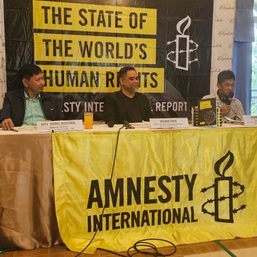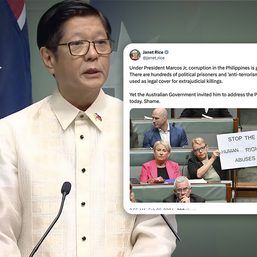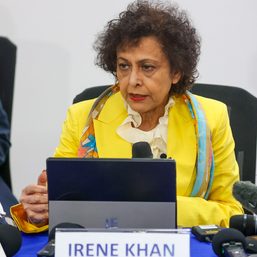SUMMARY
This is AI generated summarization, which may have errors. For context, always refer to the full article.

LONDON, United Kingdom – A Philippine delegation arrived this week in Brussels, the seat of the European Union (EU) with some senators, including presidential sister Imee Marcos, meeting the EU parliament. Expected on the agenda? the tariff perk Generalized Scheme of Preferences Plus (GSP+).
Senator Sonny Angara, co-head of the delegation, confirmed to Rappler on Wednesday, October 26, the lineup in Brussels which includes Marcos and Senators Koko Pimentel, Sherwin Gatchalian, and Mark Villar. Sources told Rappler the delegation is part of a charm offensive to keep the GSP+ status which will expire in 2023, and which the Philippines will have to apply for again.
Angara said that while he’s not sure if the GSP+ is the main agenda, “we were briefed by the Department of Foreign Affairs [if it comes up],” he told Rappler in a message. The inter-parliamentary meeting will take place on Thursday, October 27.
Trade Assistant Secretary Allan Gepty, who is also in Brussels, told Rappler “GSP+ is always an agenda in our discussions with the EU noting its importance in promoting socio-economic development.”
After six years of strained EU relations under former president Rodrigo Duterte, and an upcoming renewal that is said to be more stringent, “I think this mission is more on confidence-building,” Joseph Purugganan, head of the group Trade Justice Pilipinas, which is involved in EU free trade talks, told Rappler in an interview from Geneva on Tuesday, October 25.
Why is it important?
GSP+ gives special incentives and zero tarriffs on 6,200 Philippine products, including fruits, animal and vegetable fat, textile, footwear, vehicle parts and metals. It is given and retained on the condition that the Philippines complies with a human rights standard.
This was put at risk under Duterte, with the EU parliament condemning the human rights problems repeatedly, the latest being at the tailend of his presidency in February. The EU parliament is a different unit than the European Commission which holds the power to suspend or withdraw the perk.
Trade Justice Pilipinas has been calling on the Commission to at least start the withdrawal process and pose a real threat to the then-Duterte government in the hopes that it would prompt policy changes – for example, scrapping the bloody drug war which has killed an estimated 27,000 drug suspects, according to various human rights groups. The drug war itself is under investigation in the International Criminal Court for alleged crimes against humanity.
But the EU just always warned, and never suspended the status, much less started a withdrawal process.
“Since the withdrawal procedures were not initiated, there was no period of intensive monitoring and engagement, and the situation on the ground, in fact, deteriorated,” Purugganan said.
Why would the EU hold back on the Philippines, when it partially withdrew the similar duty-free perk, Everything but Arms (EBA), to Cambodia in 2020 because of human rights violations?
“More economic considerations than political are more apparent to me since businesses in the EU also benefit from the trade agreement. Perhaps a balancing of interests was also considered. If suspended, the government would have probably looked to trade with other countries,” former human rights commissioner Karen Gomez-Dumpit told Rappler in an interview from Manila on Monday, October 24.
Challenge for Marcos
Duterte strained the GSP+ talks in his entire term. Former trade secretary Ramon Lopez even said the EU parliament resolution in February was based on “fake news.”
Lopez said at the time that “it is unfortunate that the politicians of a huge economic block are the ones destroying the image of (a) small democratic country of peace-loving Filipinos, and it is like bullying a small country.”
But President Ferdinand “Bongbong” Marcos Jr. has, so far, been very diplomatic and, in fact, has sent signals to the international community that he will comply with human rights standards. Unfortunately for Marcos, if the EU held back throughout Duterte’s term for whichever consideration, the GSP+ status of the Philippines will expire by the end of 2023.
“The new scheme, which will be in place as of 2024, will have more stringent requirements than the current one – including, notably, a plan of action or roadmap for compliance. Filipino people, media, civil society, business community, politicians need to know what exactly is expected by the government, and what exactly is at stake,” Claudio Francavilla, Human Rights Watch EU advocate, told Rappler in an interview from Brussels on Tuesday, October 25.
“It’s past the 100 day-period, we need to see evidence-based results coming from not only government, but other independent observers,” said Dumpit.
“They should put an end to the bloody drug war, seriously investigate and prosecute those responsible for the killings, end the practice of red-tagging and secure accountability for the too many killed or harassed so far, release critics like Leila de Lima and Maria Ressa, repeal abusive legislation, and enact the reforms necessary to comply with the human and labor rights treaties they have ratified,” said Francavilla.
The feared anti-terror law, petitioned in the Supreme Court to be an unconstitutional crackdown on dissenters, is an example of questioned legislation. In March, Sri Lanka amended its own version of an anti-terror law when threatened to be stripped off its GSP+.
Marcos administration’s approach
DTI’s Gepty said they will present, among others, the results of the United Nations Joint Programme, which operationalized the technical assistance offered by the UN Human Rights Council. The technical assistance was slammed by human rights organizations in the Philippines and abroad as being too soft on Duterte.
“My view is that any issues or allegations raised must be received with utmost circumspection, and must be verified and placed in its proper context. It is important to note that the Philippine Government is always willing to work with the EU and other partners to address any issues and concerns on human rights,” said DTI’s Gepty.
The EU is very much aware of the human rights violations under the dictatorship of Marcos’ father, and the alliance of the Marcoses and Dutertes, however fragile it has become since the elections.
When he gave an interview to the American wire agency Associated Press, Marcos said of Duterte’s brutal drug war: “his people went too far sometimes.” But Marcos has not scrapped the drug war – the police circular that put into effect the anomalous Oplan TokHang is still a live document.
“New government, old abuses – but this time with a smile. We don’t need a government that is good on rhetoric, but one that is good on action. We need deeds, not words,” said HRW’s Francavilla.
The EU not withdrawing the GSP+ benefits from the Philippines “arguably jeopardizes the very credibility of the GSP system,” said Francavilla.
Gepty said 26% of our total exports to the EU are GSP+ qualified, so if the Philippines loses the status, “the comparative advantage of our exporters (which may include local and foreign manufacturers/investors) will be affected. Corollary to this, there can also be an effect on employment.”
Is keeping or renewing the status in 2023 a powerful enough tool to move Marcos to reverse some of Duterte’s actions?
“I think the EU should be very clear in publicly stating what the Marcos government needs to do in order to meet the conditions necessary to apply for the new scheme…. At stake are jobs, economic growth, relations and economic cooperation with one of the biggest and richest economic blocs in the world. Will the new government really prefer sacrificing all that over just respecting its people’s rights and securing justice for the crimes they suffered?” said Francavilla. – Rappler.com
Add a comment
How does this make you feel?
![[In This Economy] Marcos’ POGO ban is popular, but will it work?](https://www.rappler.com/tachyon/2024/07/thought-leaders-marcos-pogo-ban.jpg?resize=257%2C257&crop=255px%2C0px%2C720px%2C720px)
![[Rappler Investigates] POGOs no-go as Typhoon Carina exits](https://www.rappler.com/tachyon/2024/07/newsletter-graphics-carina-pogo.jpg?resize=257%2C257&crop=424px%2C0px%2C1080px%2C1080px)










![[OPINION] In the Philippines, the fight for the climate is a fight against state violence](https://www.rappler.com/tachyon/2024/02/imho-contexualizing-state-violence.jpg?resize=257%2C257&crop=265px%2C0px%2C720px%2C720px)



![[Just Saying] SONA 2024: Some disturbing points](https://www.rappler.com/tachyon/2024/07/TL-marcos-sona-points-july-23-2024.jpg?resize=257%2C257&crop=335px%2C0px%2C720px%2C720px)

There are no comments yet. Add your comment to start the conversation.